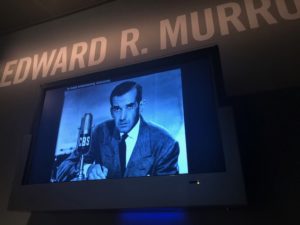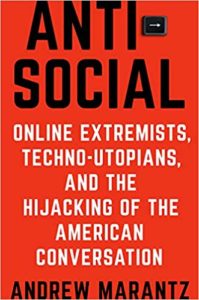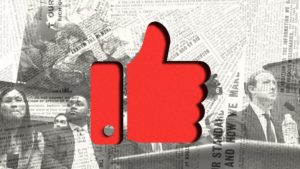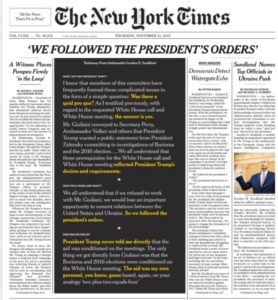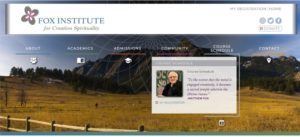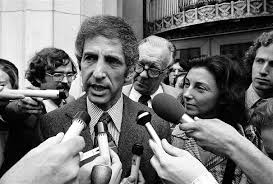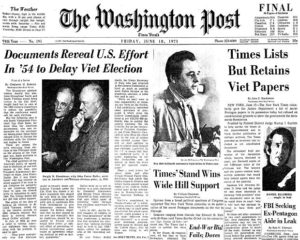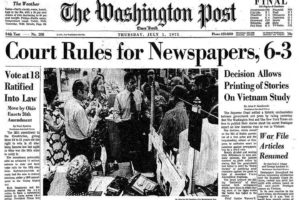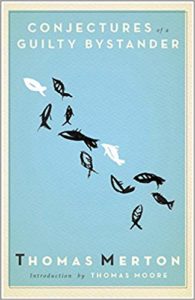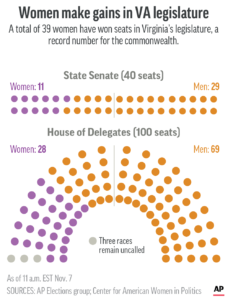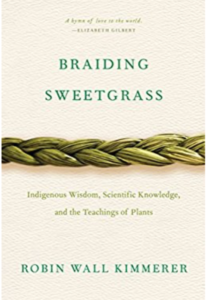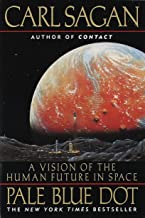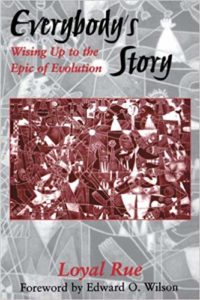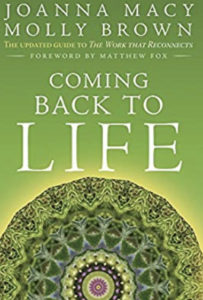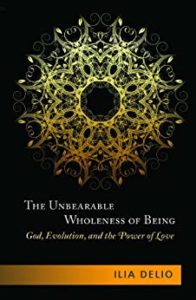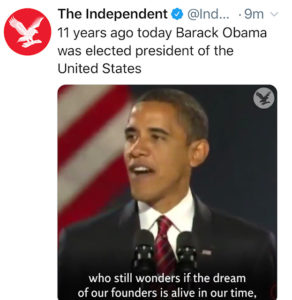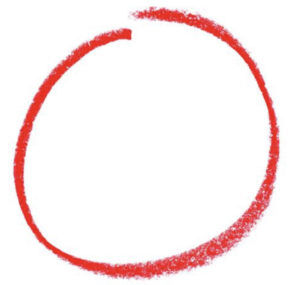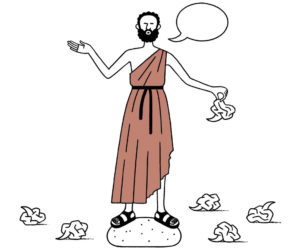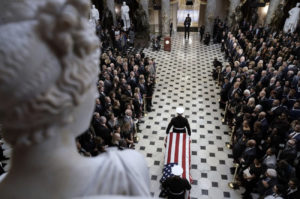“A great American.”
November 29, 2019
Dorothy Day died Nov 29 1980. When she was a child in Chicago, Dorothy went to visit her friend Katheryn Barrett in a neighboring tenement apartment. Bursting into the kitchen she found Katheryn’s mother kneeling on the floor saying her prayers.
Day writes, “I felt a warm burst of love toward Mrs. Barrett that I have never forgotten, a feeling of gratitude and happiness that still warms my heart when I remember her. …
One pauses to consider that behind every great saint there are undoubtedly many other anonymous figures like Mrs. Barrett, who could never conceive the influence of their simple witness.
Today Day’s cause for canonization is in process. Pope Francis cited her as one of 4 “great Americans.” [Robert Elsberg, publisher, Orbis Books]
Dorothy Day:
Don’t call me a saint. I don’t want to be dismissed so easily.
The greatest challenge of the day is: how to bring about a revolution of the heart, a revolution which has to start with each one of us?
Affirm, Protect & Defend
November 26, 2019DT’s dictator-like administration is attacking the values America holds dear
“We’re up against a crisis I never thought I’d see in my lifetime: a dictator-like attack by President Donald Trump on everything this country stands for. As last week’s impeachment hearings made clear, our shared tolerance and respect for the truth, our sacred rule of law, our essential freedom of the press and our precious freedoms of speech — all have been threatened by a single man.
Our shared tolerance and respect for the truth, our sacred rule of law, our essential freedom of the press and our precious freedoms of speech — all have been threatened by a single man.
It’s time for Trump to go — along with those in Congress who have chosen party loyaltyover their oath to “solemnly affirm” their support for the Constitution of the United States. And it’s up to us to make that happen, through the power of our votes.
When Trump was elected, though he was not my choice, I honestly thought it only fair to give the guy a chance. And like many others, I did. But almost instantly he began to disappoint and then alarm me. I don’t think I’m alone.
Tonight it pains me to watch what is happening to our country. Growing up as a child during World War II, I watched a united America defend itself against the threat of fascism. I watched this again, during the Watergate crisis, when our democracy was threatened. And again, when terrorists turned our world upside down.
During those times of crises, Congress came together, and our leaders came together. Politicians from both sides rose to defend our founding principles and the values that make us a global leader and a philosophical beacon of hope for all those seeking their own freedoms.
What is happening, right now, is so deeply disturbing that instead of the United States of America, we are now defined as the Divided States of America. Leaders on both sides lack the fundamental courage to cross political aisles on behalf of what is good for the American people.
We’re at a point in time where I reluctantly believe that we have much to lose — it is a critical and unforgiving moment.
We’re at a point in time where I reluctantly believe that we have much to lose — it is a critical and unforgiving moment. This monarchy in disguise has been so exhausting and chaotic, it’s not in the least bit surprising so many citizens are disillusioned.
The vast majority of Americans are busy with real life; trying to make ends meet and deeply frustrated by how hard Washington makes it to do just that.
But this is it. There are only 11 months left before the presidential election; 11 months before we get our one real chance to right this ship and change the course of disaster that lies before us.
Let’s rededicate ourselves to voting for truth, character and integrity in our representatives (no matter which side we’re on). Let’s go back to being the leader the world so desperately needs. Let’s return, quickly, to being simply … Americans.”
Algorithms…the New Gatekeeper
November 24, 2019“Cassius was right. ‘The fault, dear Brutus, is not in our stars, but in ourselves.'”
Edward R. Murrow
March 9th, 1954, CBS
#Newseum
The media has been dancing around this issue, for obvious reasons, far too long.
Actor and comedian Sacha Baron Cohen delivered a blistering speech against social media and internet companies on Thursday evening and accused of them spreading “hate, conspiracies and lies.” Speaking at the Anti-Defamation League’s Never is Now summit in New York, Cohen specifically pointed the finger at Facebook, Google, Twitter and YouTube and accused the companies of pushing “absurdities to billions of people.” He called for a “fundamental rethink of social media.”
During his speech, Cohen rebutted points made by Facebook’s Mark Zuckerberg when the CEO spoke about free speech to Georgetown University in October. “First, Zuckerberg tried to portray this whole issue as ‘choices around free expression’. That is ludicrous. This is not about limiting anyone’s free speech. This is about giving people, including some of the most reprehensible people on earth, the biggest platform in history to reach a third of the planet.
Here is the full transcript, from his prepared remarks:
In a speech last night at the Anti-Defamation League (ADL), the actor and comedian Sacha Baron Cohen attacked Facebook and other social media platforms for enabling the proliferation of hate speech and misinformation.
The speech was striking in its sincerity – Baron Cohen appeared as himself, rather than “in character” as one of his satirical personas – and its blistering tone.
Describing Facebook as “the greatest propaganda machine in history”, Baron Cohen argued that the company, which does not vet political ads for truthfulness, would have allowed Hitler to run propaganda on its platform.
Here is the full transcript, from his prepared remarks:
Conflict is attention. Attention is influence.
The Atlantic
The Dark Psychology of Social Networks
Why it feels like everything is going haywire
By Jonathan Haidt & Tobias Rose-Stockwell
For example, in “Federalist No. 10,” James Madison wrote about his fear of the power of “faction,” by which he meant strong partisanship or group interest that “inflamed [men] with mutual animosity” and made them forget about the common good. He thought that the vastness of the United States might offer some protection from the ravages of factionalism, because it would be hard for anyone to spread outrage over such a large distance. Madison presumed that factious or divisive leaders “may kindle a flame within their particular States, but will be unable to spread a general conflagration through the other States.” The Constitution included mechanisms to slow things down, let passions cool, and encourage reflection and deliberation.
Madison’s design has proved durable. But what would happen to American democracy if, one day in the early 21st century, a technology appeared that—over the course of a decade—changed several fundamental parameters of social and political life? What if this technology greatly increased the amount of “mutual animosity” and the speed at which outrage spread? Might we witness the political equivalent of buildings collapsing, birds falling from the sky, and the Earth moving closer to the sun?
[…]
Facebook’s early mission was “to make the world more open and connected”—and in the first days of social media, many people assumed that a huge global increase in connectivity would be good for democracy. As social media has aged, however, optimism has faded and the list of known or suspected harms has grown: Online political discussions (often among anonymous strangers) are experienced as angrier and less civil than those in real life; networks of partisans co-create worldviews that can become more and more extreme; disinformation campaigns flourish; violent ideologies lure recruits.
[…]
Social media turns many of our most politically engaged citizens into Madison’s nightmare: arsonists who compete to create the most inflammatory posts and images, which they can distribute across the country in an instant while their public sociometer displays how far their creations have traveled.
https://www.theatlantic.com/magazine/archive/2019/12/social-media-democracy/600763/
From the December 2019 issue.
'Morality, if it is to remain or become morality, must be perpetually examined, cracked, changed, made new...not everything that is faced can be changed; but nothing can be changed until it is faced.' -James Baldwin
ANTISOCIAL
Online Extremists, Techno-Utopians, and the Hijacking of the American Conversation
By Andrew Marantz
REVIEW: NYTimes
Forget the decline of gatekeepers. Imagine a world bereft of gates and uncrossable lines, with no discernible rules.
All this is what Marantz calls “American Berserk,” and the damage has been severe on a worldwide scale. Marantz is right to worry. As I have written in my Opinion columns for this newspaper, I have seen firsthand how social media sites amplify villainous voices and weaponize them, too — and it’s not clear they can be controlled. The optimism of social media’s creators has been overshadowed by the cynicism of the vicious propaganda spewed on their platforms.
In a recent column for The Times, titled “Free Speech Is Killing Us,” Marantz sounded the alarm. “Having spent the past few years embedding as a reporter with the trolls and bigots and propagandists who are experts at converting fanatical memes into national policy, I no longer have any doubt that the brutality that germinates on the internet can leap into the world of flesh and blood,” he wrote. “The question is where this leaves us. Noxious speech is causing tangible harm. Yet this fact implies a question so uncomfortable that many of us go to great lengths to avoid asking it. Namely, what should we — the government, private companies or individual citizens — be doing about it?”
Unfortunately, he has no real answers, except that all things eventually fall apart. Perhaps the jig is up, as the big platforms and the regulators who worry about what they have wrought begin to crack down on the system they’ve established. “The ranking algorithms on social media laid out clear incentives: provoke as many activating emotions as possible; lie, spin, dog-whistle; drop red pill after red pill; step up to the line repeatedly, in creative new ways.”
The Public Square of Spirit & Compassion & Disinformation
November 21, 2019Sister of Social Service Simone Campbell of Social Service Simone Campbell is an author, lawyer, poet, and Executive Director of NETWORK, an organization that lobbies on issues of economic justice, immigration reform, and healthcare.
My faith impels me into the public square. It is abundantly clear that Pope Francis is correct when he says that faith has real consequences in the world . . . and these consequences involve politics. . . . Religion/politics is at the heart of my contemplative practice. I am nourished daily by the people I meet and whose stories I hear. My heart is broken open by the truth of their hunger and hope. It is not a theoretical reality for me. My meditation has become breath, that we might see, that we might walk, and, in the process, heal our society that is famished for community and knowing that we belong to each other. . . .
No one can be left out of my care. Therefore [our] political work is anchored in caring for those whom we lobby as well as those whose cause we champion. This was illustrated for me recently when I was . . . lobbying a . . . Senator. . . . I commented on the story of a constituent and asked her how her colleagues could turn their eyes away from the suffering and fear of their people. The conversation went on a bit, and then the senator came back to my question. She said that . . . they did not get close to the candid stories of their people. In fact, some did not see these constituents as “their people.” Tears sprang to my eyes at her candor and the pain that keeps us sealed off from each other because of political partisanship. . . .
In many ways, we are a bit like the senators who close themselves off from the needs of their constituents. We could get caught in the pain of rejection and blame, fighting against an unjust judgment. But for me, the contemplative perspective leads to letting go of my desires and control while opening to the gift of the moment. My consistent learning is that behind the loss is always a surprise, opening into something new. There are prices to be paid, but they are small when compared to the hunger of our people. . . .
My prayer has led me to compassion. Compassion often leads to much more nuanced analysis. . . . The Spirit has pushed us out of our comfort zone of acceptability in order to meet the needs of people we had not known were ours. . . .
-Center for Action and Contemplation
As a platform for disinformation, it is a weapon. To be used intentionally as a platform for disinformation, it is an atomic bomb.
AXIOS
Ad targeting is how Facebook, Google and other online giants won the internet. It’s also key to understanding why these companies are being held responsible for warping elections and undermining democracy, managing editor Scott Rosenberg writes in the opening installment of our “What Matters 2020” series.
- Critics and tech companies are increasingly considering whether limiting targeting of political ads might be one way out of the misinformation maze.
- Giant platforms would still allow campaigns and candidates to purchase political ads — but the companies would stop (either voluntarily or by law) selling messages aimed only at narrow segments of the electorate.
How ad targeting works: Facebook and Google have somewhat different systems for targeting ads, but both allow advertisers to bid on narrowly defined demographic groups or keywords.
- For instance, you can tell Facebook to show your message only to Southern men who don’t have a college degree and earn less than $75,000 — or ask for married suburban moms in three ZIP Codes outside Indianapolis who own SUVs and play tennis.
- In the political ad world, these tools allow candidates and groups to exploit those populations’ anxieties and resentments, efficiently.
The link between ad targeting and misinformation … Tech platforms stand accused of multiple sins, including:
- Improperly collecting users’ data to build massive databases of profiles.
- Allowing politicians and their campaigns to spread lies.
- Creating partisan “echo chambers” and “filter bubbles” that segment reality by ideology.
Facebook and Google didn’t invent these phenomena — they existed pre-internet. But by tying them together, ad targeting can kick misinformation into overdrive:
- Data collection and profile building is what makes ad targeting possible. It’s also what keeps getting tech platforms in trouble with users and governments.
- Campaigns have always shaded the truth and even lobbed false accusations. But in a broadcast world, it was easy for opponents and neutral third parties to witness and call out such behavior.
- In the world of micro-targeted ads, it’s almost impossible — despite transparency efforts like Facebook’s ad library.
- Misleading ads fuel frenzies in the closed-loop worlds of partisan echo chambers long before platforms can step in to bar them.
Banning all political ads vs. banning targeting: Many critics have urged social media platforms to bar political advertising altogether — a move both Google and Facebook have resisted, even as their smaller but politically high-profile competitor Twitter said it would embrace it.
- Facebook argues that such a ban would harm outsider candidates and causes.
- Twitter’s ban is significant, but its ad market share and targeting capabilities are minuscule compared to Facebook’s and Google’s.
The idea of a targeting ban has gained momentum recently, with figures like Bill Gates and FEC chair Ellen Weintraub endorsing it.
- Defenders of the status quo argue that online targeting isn’t fundamentally different from longtime campaign practices like ZIP Code targeting of postal flyers, and they maintain that it’s a free-speech issue.
The Guardian
‘DT, hosted the Facebook chief executive Mark Zuckerberg for a private dinner at the White House last month.
NBC News revealed that the meeting, which had not previously been disclosed, took place when Zuckerberg was in Washington being grilled by Congress over topics including Facebook’s limited steps to ban to misinformation in political advertising.
NBC (also) reported the billionaire entrepreneur Peter Thiel, a conservative who donated to Trump’s 2016 campaign and sits on Facebook’s board, was also present at the meeting.’
Thiel, who is the chairman of private data technology company Palantir, donated $1.25m to DT’s 2016 presidential campaign. In August a report by Mijente, a Latinx organizing not-for-profit, found that Palantir has more than $1.5bn in federal government contracts.
[According to Forbes, Thiel has a net worth of $2.5 billion.]
#PeterThiel
Huffington Post
“…an essay published in 2009, (Thiel) surprised many when he wrote that giving women the right to vote — by constitutional amendment in 1920 — was a blow to democracy.”
History is contingent.
November 12, 2019Matthew Fox, a 76-year-old elder, activist and spiritual theologian, along with Skylar Wilson, a 33-year-old wilderness guide, leader of inter-cultural ceremonies, and an event producer, and Jennifer Berit Listug, a 28-year-old writer, spiritual leader, and publicist, are presenting a challenge and an opportunity in the vision launched in this modest book. That vision is about creating an Order of the Sacred Earth. Essay contributors to the book and its vision include Mirabai Starr, Brian Thomas Swimme, Adam Bucko, and David Korten.
‘In this book the author and contributors present opportunity for building an intergeneration community devoted to environmental activism through restoring a sense of the sacred.
Order of the Sacred Earth is for everyone from all faiths and religions, races, lifestyle choices, generations, professions and ancestry. All are welcome…all are needed…to build a conscious of the whole in service to the Earth and to one another.
1976: Institute for Creation Spirituality, Boulder Colorado
Fox invites us to listen to our deep calling by asking:
What can most readily stir us at his time in history to wake up, let go, give birth and work generously and diligently for the survival of our species and of our planet? What links the wisdom of the young to the wisdom of the old and of our ancestors, while opening our heart and mind to serve future generations with joy and resolve?
What most empowers us to move from inertia to effective caring and action, from despair or cynicism to hope-filled service?’
-Science of Mind
Pass it on.
“Courage is contagious.”
Daniel Ellsberg, activist and former United States military analyst who, in 1971, secretly gave the Pentagon Papers to the Washington Post.
‘The Politics of Death’
November 11, 2019V E T E R A N S D A Y
Thomas Merton:
In moments that appear to be lucid, I tell myself that in times like these there has to be something for which one is willing to get shot, and for which, in all probability, one is actually going to get shot. What is this? A principle? Faith? Virtue? God? The question is not easy to answer, and maybe it has not answer that can be put into words. Perhaps this is no longer something communicable, or even thinkable. To be executed today (and death by execution is not all uncommon) one has no need to commit a political crime, to express opposition to a tyrant, or event to hold an objectionable opinion. Indeed, most political deaths under tyrannical regimes are motiveless, arbitrary, absurd. You are shot, or beaten to death, or started, or worked until you drop, not because of anything you have done, not because of anything you believe in, not because of anything you stand for, but arbitrarily: your death is demanded by something or someone undefined. Your death is necessary to give apparent meaning to a meaningless political process which you have never quite managed to understand
-Conjectures of a Guilty Bystander
Equal Justice Initiative
‘African Americans bravely served in the U.S. military for generations. But instead of being treated as equal members of society, thousands of black veterans were accosted, attacked, or lynched.’
https://eji.org/news/remembering-black-veterans-and-racial-terror-lynchings
~
Society of Professional Journalists
“Aside from deep understanding and technical knowledge of the military and veteran issues, vets bring with them objectivity, neutrality, and ability to work in crises—all valuable attributes for newsrooms.”
The new nonprofit Military Veterans in Journalism wants to bring more military knowledge and experience into the media
Since the attacks of 9/11, the United States has been in a perpetual state of fighting, in places like Afghanistan, Iraq, Syria, Yemen, Somalia, and Libya. About 7,000 American troops have been killed and at least another 50,000 wounded. One study estimates the U.S. federal price tag of the Iraq and Afghanistan conflicts at $5.9 trillion.
Despite more than 18 years of war, America’s newsrooms have been shockingly negligent in hiring reporters who know these conflicts and their impacts best—our veterans.
Only 1.1 percent of media workers in the U.S. are post-9/11 military veterans while about 7 percent of Americans have served in the military, according to U.S. Census Bureau data.
Women: The Most Powerful Electorate
“Never forget that it only takes one political, economic or religious crisis for women’s rights to be put in jeopardy. Those rights are never to be taken for granted; you must remain vigilant throughout your life.”
-Simone de Beauvoir
AXIOS
A surge of female winners in this week’s state elections — most of them Democrats, and many of them women of color — reflected women’s rising power since the 2016 election, AP’s Sarah Rankin and Sara Burnett report.
In Virginia, Juli Briskman, a cyclist who was fired after she flipped off President Trump’s motorcade, was elected to the Loudoun County Board of Supervisors, representing an area that’s home to one of his golf courses.
In Maine, a 23-year-old Somali American woman was elected to the Lewiston City Council, defeating another Democrat and what she described as “internet trolls” who lobbed racist and sexist attacks via social media.
|
APTuesday was an extension of the blue wave in 2017, when Democrats picked up 15 Virginia House seats, with 11 won by women. The next year, three women in the state defeated incumbent Republicans in the U.S. House. One of those women, Rep. Abigail Spanberger, said the campaigns in Virginia haven’t just been won by women, but they’ve also been powered by female volunteers and animated by issues women prioritize — such as gun violence prevention and health care. Spanberger read Tuesday’s results as evidence of the success of centrist, pragmatic politics. She advised Democrats with national ambition to “pay attention.” “People want us to act, to focus on solving problems, not be the most ideologically pure,” she said. “People are not expecting perfection. But they are expecting you to try.” DT’s approval rating among women has been lower than with men throughout his presidency. Pew Research Center data shows DT’s average approval rating over his first two years in office was 44% among men, compared with 31% among women, a gap in presidential approval wider than for other recent presidents, including Barack Obama, George W. Bush, Bill Clinton and George H.W. Bush. “(Women have) just decided, ‘OK, if someone like this can get elected, something is very, very wrong, and we need to start speaking up and changing it.’” |
Shhhhhh…the trees are speaking.
November 8, 2019Robin Wall Kimmerer:
In the old times, our elders say, the trees talked to each other. They’d stand in their own council and craft a plan. But scientists decided long ago that plants were deaf and mute, locked in isolation without communication. The possibility of conversation was summarily dismissed. Science pretends to be purely rational, completely neutral, a system of knowledge-making in which the observation is independent of the observer. And yet the conclusion was drawn that plants cannot communicate because they lack the mechanisms that animals use to speak. . . . But pollen has been carried reliably on the wind for eons, communicated by males to receptive females to make . . . nuts. If the wind can be trusted with that fecund responsibility, why not with messages?
There is now compelling evidence that our elders were right—the trees are talking to one another. They communicate via pheromones, hormonelike compounds that are wafted on the breeze, laden with meaning. Scientists have identified specific compounds that one tree will release when it is under the stress of insect attack—gypsy moths gorging on its leaves or bark beetles under its skin. The tree sends out a distress call: “Hey, you guys over there? I’m under attack here. You might want to raise the drawbridge and arm yourselves for what is coming your way.” The downwind trees catch the drift, sensing those few molecules of alarm, the whiff of danger. This gives them time to manufacture defensive chemicals. . . . The individual benefits, and so does the entire grove. Trees appear to be talking about mutual defense. . . . There is so much we cannot yet understand with our limited human capacity. Tree conversations are still far above our heads.
Some studies of mast fruiting have suggested that the mechanism for synchrony comes not through the air, but underground. [1] The trees in a forest are often interconnected by subterranean networks of mycorrhizae, fungal strands that inhabit tree roots. The mycorrhizal symbiosis enables the fungus to forage for mineral nutrients in the soil and deliver them to the tree in exchange for carbohydrates. The mycorrhizae may form fungal bridges between individual trees, so that all the trees in a forest are connected. These fungal networks appear to redistribute the wealth of carbohydrates from tree to tree. A kind of Robin Hood, they take from the rich and give to the poor so that all the trees arrive at the same carbon surplus at the same time. They weave a web of reciprocity, of giving and taking. In this way, the trees all act as one because the fungi have connected them. Through unity, survival. All flourishing is mutual.
Fr. Richard Rohr, Center for Action & Contemplation:
‘For too long science and faith fell into the “sin of certainty,” each claiming Truth only for themselves and ignoring the beautifully symbiotic relationship that exists between them. Scientists like Robin Wall Kimmerer are an essential part of the Great Turning, dissolving the artificial binaries that have walled them off from one another. May we all have minds and hearts open enough to integrate the wisdom of our spiritual elders.’
Are trees social beings? In this international bestseller, forester and author Peter Wohlleben convincingly makes the case that, yes, the forest is a social network. He draws on groundbreaking scientific discoveries to describe how trees are like human families: tree parents live together with their children, communicate with them, support them as they grow, share nutrients with those who are sick or struggling, and even warn each other of impending dangers. Wohlleben also shares his deep love of woods and forests, explaining the amazing processes of life, death, and regeneration he has observed in his woodland.
After learning about the complex life of trees, a walk in the woods will never be the same again.
‘…we see what we believe.’
November 6, 2019We think that we believe what we see. Actually, the opposite is true: we begin with belief, and then we see. What do you believe?
-Judith Lasater, PhD.
Think about trust…whom you put your trust in. Trust is earned.
-Alexandra Stoddard
ELIZA ANYANGWE:
‘Corporations and billionaires get tax cuts while convincing individuals that our consumer choices make the world a better place.
Today, managing editor Eliza Anyangwe makes one thing clear: we must let go of our misguided devotion to personal agency and take action alongside other people if we want to bring these systems down.
History shows that the only way to change the system is to stand with the people around us and fight it head on.
Individual action isn’t bad or meaningless – it’s completely natural – but it’s no substitute for tax reform, migration policy reform, criminal justice reform, intellectual property law reform, international trade law reform and so on.
It’s clear that when we have the means, we’re happy to act – recycle, buy ethical, go green – but we need to think beyond our individual actions and choices and learn to talk, plan, and get to work alongside others if anything is going to change.
On occasion, falling down the rabbit hole that is Instagram yields positive results. It was there, on the social media platform, where I learned that American writer Anand Giridharadas would be speaking in Amsterdam. And, as though the gods of procrastination were this once glad to reward me for my fealty, the event would be free.
And so off I went to listen to the best-selling author of Winners Take All talk about the fallacy of “win-win”. Our economic model, Giridharadas explained, was indeed creating winners – who were winning by greater margins than they’d ever done at any other period in human history. But, there were also losers, left to gather up the crumbs from under the table; and a new entrepreneurial class who believed in their ability to “do well and do good”.
[…]
(American writer Anand) Giridharadas offered an answer: perhaps the success of our current system was in part thanks to the ability of that system to focus our attentions on personal agency rather than systemic transformation.
I believed in the power of my own agency: if the social enterprise lark didn’t work, I would choose an employer with a moral compass. And I would be a better consumer; picking products and services that were good for people and planet. Politicians didn’t listen, I reasoned, but corporations did, and they were in charge anyway, so I would vote with my “spending power” – boycotting those brands who had poor records on the things I cared about, and rewarding with my meagre income those companies who took their social responsibility seriously.
We scarcely consider the fact that for all of its virtues, ethical or conscious consumerism is no substitute for tax reform, migration policy reform, criminal justice reform, intellectual property law reform, international trade law reform and so on. What we have contented ourselves with doing instead is essentially playing the same game (consumerism) by the same rules (I buy, therefore I am). We’ve simply changed the ball (ethical products and services).
My guess is that we fear that if we weren’t doing this – buying better, recycling more, eating less meat – we would be doing nothing at all. We have lost sight of the value, or even the possibility, of collective action and it’s easy to see why.
“If you want to go fast, go alone. If you want to go far, go together.”
But (this) will force me to reimagine what good I can do alongside other people, rather than in spite of them. I will see and hear the challenges of those who are most intimately affected by the issues, and maybe one day, when one of us has a grand idea that can “bring the whole system down”, we’ll know other foot soldiers who can stand alongside us.’
Rev. Masando Hiraoka, Mile Hi Church in Lakewood, Colorado:
“I’ve got to make a confession: I often find it hard to relate with the religious figures of the past. Feeling this, I can also breathe into the vows of the Buddhist who takes refuge in the Buddha, the Dharma and the Sangha as my grandfather took refuge in the Colorado, the only state that welcomed Japanese Americans during World War Ii.
This is why I love Colorado, why I take such pride in where I’m form. It was sanctuary, like the sanctuary that Medina became for Muhammad, peace be upon him, and the first Muslims who were expelled from their home, their holy land of Mecca, because they were considered a threat.
The restoration of dignity and the seeking of safety is part of our legacy.
I believe we know how do do this togetherness. We’ve been taking refuge in each other forever. So we continue this great tradition of staring over again and again and let the ancient ones of the past come back alive in the present through us.
The story of peace is encoded in our DNA. Refuge is written on our bones.”
Center for Action & Contemplation:
“Religion is undergoing a massive shift in perspective . . . as wrenching as the Copernican revolution, which required humanity to bid farewell to an Earth-centered understanding of our place in the cosmos. The religious revolution on the horizon today might well be called the “Evidential Reformation.” We humbly shift away from a human-centric, ethnocentric, and shortsighted view of what is important. At the same time, we expand our very identities to encompass the immense journey of life made known by the full range of sciences. In so doing, we all become elders of a sort, instinctively willing to do whatever it takes to pass on a world of health and opportunities no lesser than the one into which we were born.” –The Rev. Michael Dowd, Eco-theologian
Fr. Richard Rohr:
An evidential worldview has become crucial. We now know that evolutionary and ecological processes are at the root of life and human culture. To disregard, to dishonor, these processes through our own determined ignorance and cultural/religious self-focus is an evil that will bring untold suffering to countless generations of our own kind and all our relations. We must denounce such a legacy. Ours is thus a call to . . . sacred activism. [Twenty-five] years ago, Carl Sagan both chided and encouraged us in this way:
How is it that hardly any major religion has looked at science and concluded, “This is better than we thought! The universe is much bigger than our prophets said, grander, more subtle, more elegant. God must be even greater than we dreamed.” . . . A religion, old or new, that stressed the magnificence of the universe as revealed by modern science might be able to draw forth reserves of reverence and awe hardly tapped by the conventional faiths. Sooner or later, such a religion will emerge. [1]
[1] Carl Sagan, Pale Blue Dot: A Vision of the Human Future in Space (Random House Publishing: 1994), 50.
More from Fr. Rohr:
“However, if we truly want to be a part of the “Evidential Reformation,” we must each do our part to understand and share the ways science and our faith affirm one another.”
The universe is a single reality—one long sweeping spectacular process of interconnected events. The universe is not a place where evolution happens; it is evolution happening. It is not a stage on which dramas unfold; it is the unfolding drama itself. . . . This [great cosmological] story shows us in the deepest possible sense that we are all sisters and brothers—fashioned from the same stellar dust, energized by the same star, nourished by the same planet, endowed with the same genetic code, and threatened by the same evils. This story . . . humbles us before the magnitude and complexity of creation. . . . It bewilders us with the improbability of our existence, astonishes us with the interdependence of all things, and makes us feel grateful for the lives we have. And not the least of all, it inspires us to express our gratitude to the past by accepting a solemn and collective responsibility for the future. —Loyal Rue [1]
[1] Loyal Rue, Everybody’s Story: Wising Up to the Epic of Evolution (SUNY Press: 2000), 42-43.
“Few things are more important than how we think about our inner and outer nature and our mortality. Thus far, the Evidential Reformation has been centered in science. Now is the time for our faith traditions to honor evidential revelation—facts as God’s native tongue—and carry on the vital tasks of interpretation, integration, and action.
Ours is the prodigal species. Having squandered our inheritance, we are waking up to our painful predicament. Thankfully God—Reality personified—awaits us with open arms and a welcoming heart. As Thomas Berry would remind us, the entire Earth community is rooting us on!” Rev. Michael Dowd
Fr. Rohr: “I believe we have squandered our inheritance, which is the earth itself, the majesties and mysteries it holds. We’ve taken it for granted, using it too freely for our own selfish purposes while ignoring the deeply divine messages communicated in everything from the smallest sub-atomic particle to the largest black holes. Surely it is time for us to bring science and religion together.”
Just as Augustine reinterpreted Christianity in light of Plato in the 4th century, and Aquinas integrated Aristotle in the 13th, today there are dozens of theologians across the spectrum re-envisioning the Christian faith. Whose ideas are they integrating now? Darwin, Einstein, Hubble, Wilson and all those who have corrected, and continually contribute to, an evidence-based understanding of biological, cosmic, and cultural evolution. . . .
Few things are more important than how we think about our inner and outer nature and our mortality. Thus far, the Evidential Reformation has been centered in science. Now is the time for our faith traditions to honor evidential revelation—facts as God’s native tongue—and carry on the vital tasks of interpretation, integration, and action. –Rev. Michael Dowd
The Great Turning
November 4, 2019I have set before you life and death . . . therefore choose life.
—Deuteronomy 30:19
R. Richard Rohr, Center for Action & Contemplation:
Eco-philosopher, Earth elder, friend, and spiritual activist Joanna Macy, now ninety years old, has been promoting a global transition from the Industrial Growth Society to a Life-Sustaining Society for most of her life. She calls it the Great Turning, a revolution of great urgency: “While the agricultural revolution took centuries, and the industrial revolution took generations, this ecological revolution has to happen within a matter of years.” [1] She is hopeful as she sees individuals and groups participating in “1) Actions to slow the damage to Earth and its beings; 2) Analysis and transformation of the foundations of our common life; [and] 3) A fundamental shift in worldview and values.” [2]
Macy understands that the third type of action—essentially, a new way of seeing— “require[s] a shift in our perception of reality—and that shift is happening now, both as cognitive revolution and spiritual awakening.” [3] While the shift may not be obvious in my own generation, we need look no further than the ongoing powerful and prophetic presence of young leaders, like indigenous teenagers Tokata Iron Eyes (a member of the Standing Rock Sioux tribe who plays a key role in the “Rezpect Our Water” campaign) and Autumn Peltier (also a water protector and a citizen of the Wiikwemkoong First Nation); they have been joined recently by Swedish environmental activist Greta Thunberg, who spoke at the United Nations Climate Action Summit and helped inspire Climate Strikes around the world. In the face of criticism, Greta calls her Asperger’s syndrome a “superpower” that gives her a clear perspective on the climate crisis. May we be motivated by these committed young advocates and lend our voices and strength to heal our wounded world.
Macy explains:
The insights and experiences that enable us to make this shift may arise from grief for our world that contradicts illusions of the separate and isolated self. Or they may arise from breakthroughs in science, such as quantum physics and systems theory. Or we may find ourselves inspired by the wisdom traditions of native peoples and mystical voices in the major religions; we hearken to their teachings as to some half-forgotten song that our world is a sacred whole in which we have a sacred mission. [4]
St. Hildegard von Bingen (1098–1179), a Germanic nun, mystic, and healer, was doing this 800 years ago. In her book Scivias she wrote, “You understand so little of what is around you because you do not use what is within you.” [5] Somehow, she already understood what science is now affirming: “The macrocosm is mirrored in the microcosm.” Science is finding that the world is an integrated whole rather than separated parts. Nothing in the cosmos operates independently. We are all holons, which are simultaneously whole in themselves, and at the same time part of a larger whole. This understanding is moving us from a narrow, mechanistic, Newtonian view of the universe to a holistic/ecological view. [6] Nothing is static, and if you try to construct an unchangeable or independent universe for yourself, you will be moving against the now obvious divine plan and direction.
Gateway to Presence:
If you want to go deeper with today’s meditation, take note of what word or phrase stands out to you. Come back to that word or phrase throughout the day, being present to its impact and invitation.
[1] Joanna Macy and Molly Young Brown, Coming Back to Life: The Updated Guide to the Work that Reconnects (New Society Publishers: 2014), 4.
[2] Ibid., 6. Emphasis mine.
[3] Ibid., 14.
[4] Ibid., 14.
[5] Hildegard of Bingen, Scivias, 1.2.29. Translation from Avis Clendenen, “Hildegard: ‘Trumpet of God’ and ‘Living Light’” in Chicago Theological Seminary Register, vol. 89, no. 2 (Spring 1999), 25.
[6] Ilia Delio explores the concepts of holons and moving toward a holistic view in CONSPIRE 2014: A Benevolent Universe (Center for Action and Contemplation: 2014), MP4 video download.
Mark Nepo:
‘…to have been at one with the earth, seems beyond undoing. -Rilke
Ilia Delio:
‘Creation is not a demonstration of God’s boundless power but of God’s boundless love, a love so great that creation is drenched in it.’
‘Out of a long history of cosmic cataclysms and mass extinctions, we human emerge. We are born out of stardust, cousins of daffodils and bonobos; we are the conscious voice of a fragile earth.’
…”damaging to the Gospel.”
Josh Harris: Evangelical support for Trump “incredibly damaging to the Gospel”
[Josh Harris, once one of America’s most famous evangelical pastors, admitted in his first interview since renouncing Christianity that he ruined lives and marriages, so he excommunicated himself from the faith that made him famous.- AXIOS]
Asked how much of a connection he sees between the fundamentalist doctrine of fear and the current political climate, Harris replied: “Fear is easily manipulated by political leaders. The more chaotic the world is, the more people want someone to tell them what to do. And when people are afraid, they latch on to people who say, ‘I have the answers.’ […] I don’t think it’s going to end well. To have a leader like DT is part of the indictment. This is the leader you want and deserve; it represents a lot of who you are.”
‘You’re not crazy, you’re creative.’ ✧
November 3, 2019
A Circle expands forever
It covers all who wish to hold hands
And its size depends on each other
It is a vision of solidarity
It turns outwards to interact with the outside
And inward for self critique
A circle expands forever
It is a vision of accountability
It grows as the other is moved to grow
A circle must have a centre
But a single dot does not make a Circle
One tree does not make a forest
A circle, a vision of cooperation, mutuality and care
—Mercy Amba Oduyoye
Mercy Amba Oduyoye, “The Story of a Circle” (Circle of Concerned African Women Theologians), The Ecumenical Review, vol. 53, no. 1 (January 2001), 97. Used with permission.
✧
Fr. Richard Rohr, Center for Compassion & Contemplation
- Affirming people’s potential is more important than reminding them of their brokenness.
- The work of reconciliation should be valued over making judgments.
- Gracious behavior is more important than right belief.
- Inviting questions is more valuable than supplying answers.
- Encouraging the personal search is more important than group uniformity.
- Meeting actual needs is more important than maintaining institutions.
- Peacemaking is more important than power.
- We should care more about love and less about sex.
- Life in this world is more important than the afterlife (Eternity is Gaia’s work anyway).
✧
Rilke/New Poems:
Mohammed’s Calling
…but the angel, imperious,pointed over and over
to what was written on the page he held,
and would not held and kept insisting: read.
Then the man read, and when he did the angel bowed.
It was as if he had always been reading,
and now was able to obey and bring to pass.
✧
Alexander Stoddard/Grace Notes:
’Any profound view of the world is mysticism.’ -Albert Schweitzer
Love the questions. The bigger the questions, the better. The mysteries of life have never been understood by any human so far and never will be. The little things that make you happy, the order you put into your corner of the universe, the joy you feel from these small rituals, are mysterious. You’re not crazy; you’re creative. It’s all right if you are teased. Who cares? You do these things for yourself.
✧
A BIBLICAL ROUGH DRAFT
The New Yorker
‘Many do not know that the Bible was once a “living document,” passed orally from person to person, and from generation to generation, before finally being written down. Even the most well-known Biblical passages went through countless iterations before arriving at the final, perfect, logical, cohesive, and treasured versions we now hold dear.
Early written drafts of the Bible were the transcribed pontifications of travelling “storytellers,” who tromped from village to village in floppy sandals, swatting at flies, sipping beads of dew from the undersides of donkeys, and fighting dogs for scraps of raw meat. A close reading of the earliest known transcription of a popular excerpt from the Book of Matthew reveals that the “narrator” is suffering from low blood sugar. No doubt a syphilitic holy man dressed in desert rags, he searches in vain for just the right metaphor, a well-aimed zinger with which to make his point. The toil that the poor fellow suffers in so doing undercuts the very principle he is straining to illustrate.’
[Full essay]
https://www.newyorker.com/magazine/2019/11/04/a-biblical-rough-draft
I miss Elijah.
November 1, 2019
”My mission is one that comes out of a vision that was created long, one ago. It is a mission and a vision to empower people—to make people realized that the power is within them and that they too can do the things they want to do.”
The ten newly elected U.S. Representative said he couldn’t wait to join everyone on his new journey and shared a poem [1996] that he said defines who he is.
He’d recite it to himself 20 times a day sometimes.
”I only have a minute, 60 seconds in it, forced upon me I did not choose, but I know that I must use it, give account if I abuse it, suffer if I lose it. Only a tiny little minute but an eternity is in it.”
Rep. Elijah Eugene Cummings
January 18, 1951 – October 17, 2019
—


